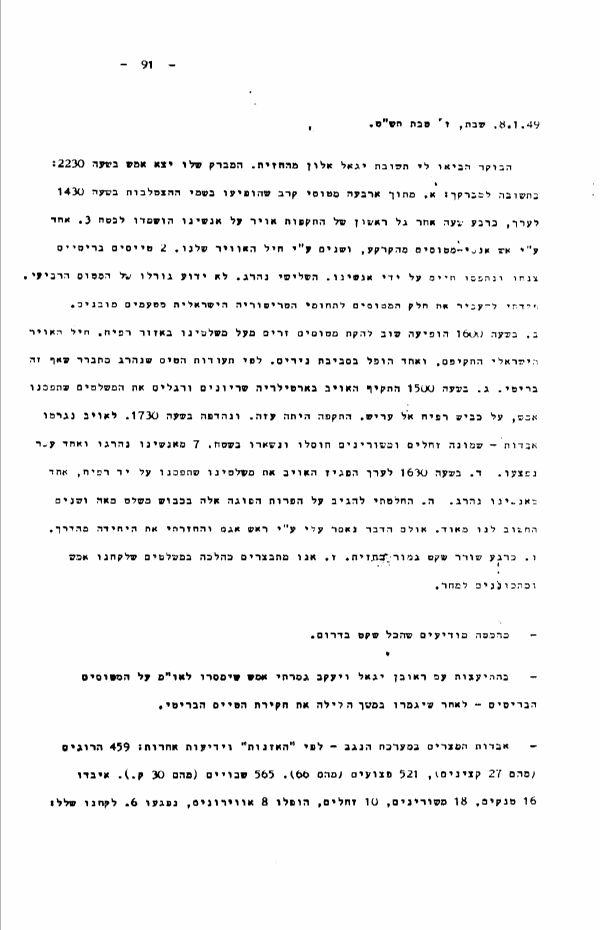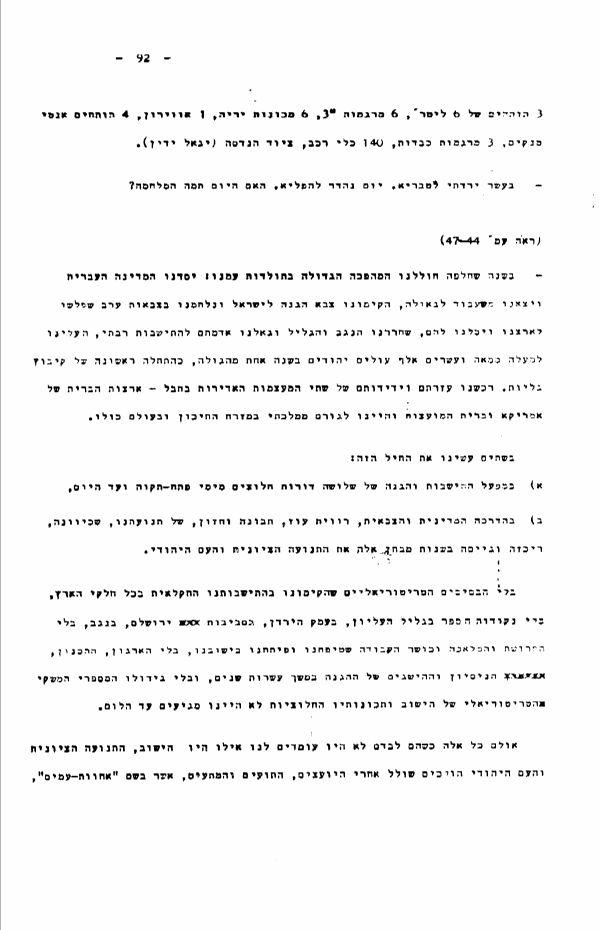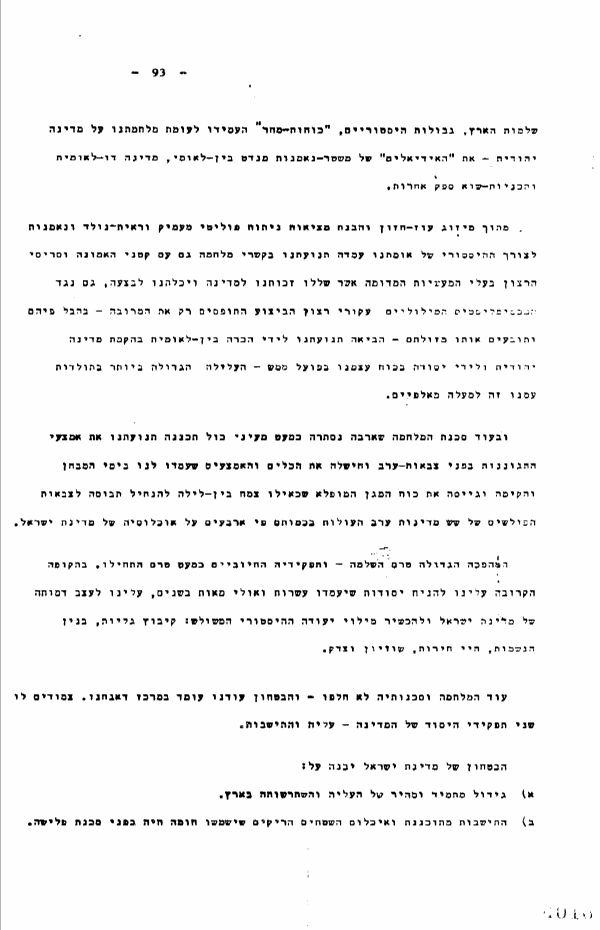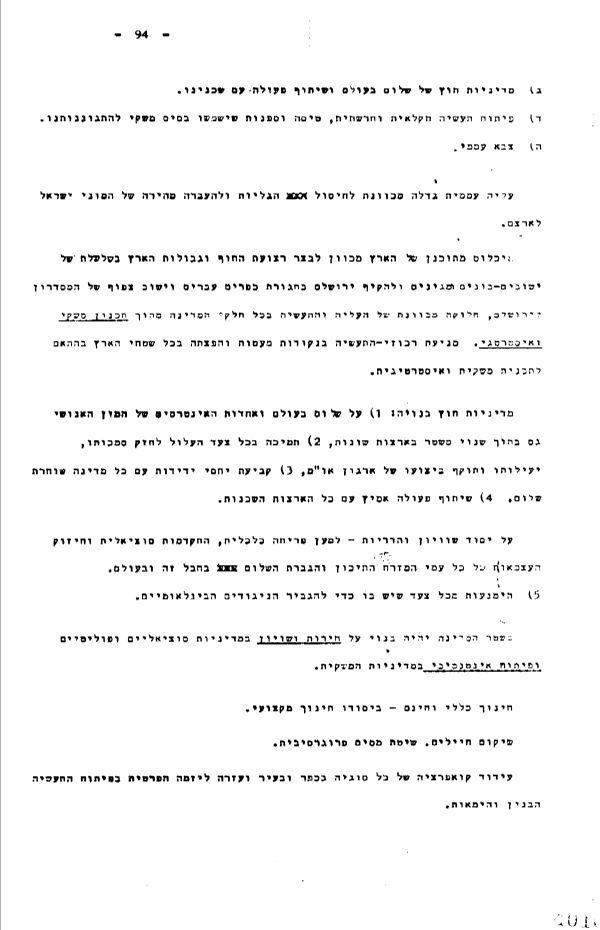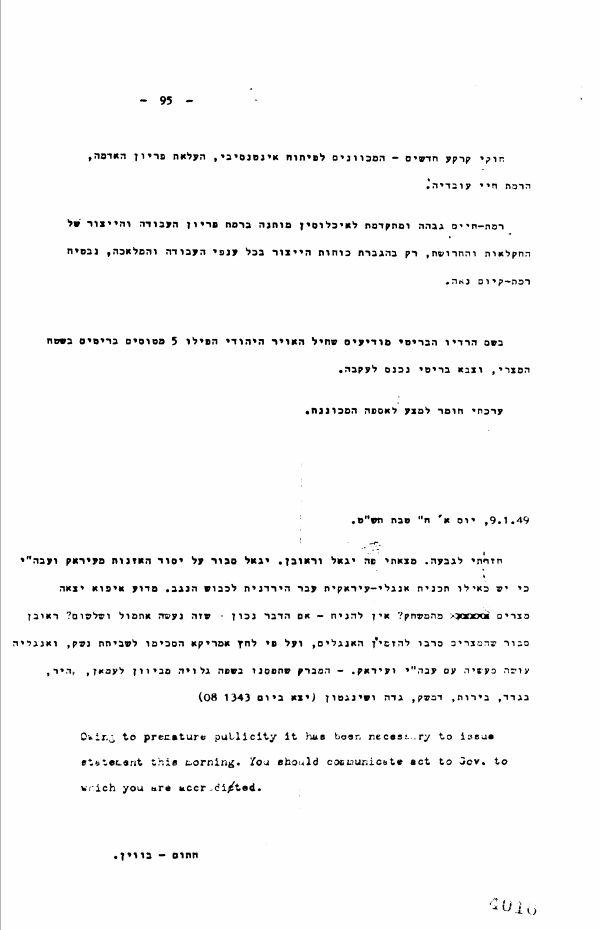Saturday, January 8, 1949
This morning they brought me Yigal Allon's reply from the front. His cable was sent last night at 2230:
"In response to your cable:
Of the four fighter planes that appeared in the sky [above?] the crossroads at approximately 1430 [sic, but the first aerial incident actually took place at 10:30], about 15 minutes after the first wave of aerial attacks on our men, 3 have definitely been destroyed. One by anti-air fire from the ground, and two by our Air Force. 2 British pilots parachuted and were captured alive by our men. The third was killed. The fate of the fourth plane is not known. I ordered that the plane part [parts?] be transferred to Israeli territory, for obvious reasons. At 1600 a group of foreign planes again appeared above our strongholds in the vicinity of Rafiah. The Israeli Air Force attacked them, and one was downed near Nirim. According to the papers of the pilot who was killed, apparently this one was also British. At 1500 the enemy, using artillery, armored vehicles, and infantry, attacked the strongholds we'd seized last night along the Rafiah - El-''Arish road. The attack was fierce, and was repelled at 1730. The enemy suffered losses - eight half-tracks and armored vehicles were destroyed and remained on the field. 7 of our men were killed and eleven were wounded. At about 1630 the enemy shelled the strongholds we'd seized near Rafiah. One of our men was killed. I decided to respond to these violations of the truce by capturing Stronghold 102 [southeast of Rafiah], which is very important to us. But I was prohibited from doing this by the head of the Operations Department and I sent the unit back. Currently there is complete quiet on the front. We are properly fortified in the strongholds that we took last night and are preparing for tomorrow."- From the Staff it's reported that all is quiet in the south.
- In consultation with Reuven [Shiloah], Yigael [Yadin], and Ya'akov [Dori], I concluded last night that they should inform the UN of the British airplanes - after completing the interrogation of the British pilot during the course of the night.
- The Egyptian losses in the Negev battle - according to "eavesdropping" and other reports: 459 killed (27 of them officers), 521 wounded (66 of them o.), 565 POWs (30 of them o.), 16 tanks lost, 18 armored vehicles, 10 half-tracks, 8 airplanes downed, 6 damaged. Plunder we captured: 3 6-pound cannons, 6 3-inch mortars, 6 [heavy] machine guns, 1 airplane, 4 anti-tank cannons, 3 heavy mortars, 140 vehicles, engineering equipment (Yigael Yadin).
- At 10 I left for Tiberias. A wonderfully glorious day.
Did the war end today?
- ["Musings of the Moment" (here Ben-Gurion inserted a handwritten cross-reference to the "Hanukkah Musings" that constituted the entry for December 25, 1948)]
Last year we launched the greatest revolution in the history of our people: we founded the Hebrew [Jewish] state and came forth from enslavement to redemption, we founded an Israel defense force and fought the Arab armies that invaded our country and overcame them, liberated the Negev and the Galilee and redeemed their land for large-scale settlement, brought more than 120,000 Jewish immigrants from the Golah [place of exile, i.e., Diaspora] in one year, as an initial act of kibbutz galuyot [ingathering of the exiles]. We secured the support and friendship of the two greatest superpowers in the world - the United States of America and the Soviet Union - and we became an official state actor in the Middle East and the entire world.
We achieved this success through two [factors]:
An enterprise of settlement and defense involving three generations of halutzim [Zionist pioneers] from the days of Petah Tikva to this day; The political and military training, rife with courage, wisdom, and vision, of our movement, which directed, coordinated, and enlisted the Zionist movement and the Jewish People during these testing years.Without the territorial bases that we established through our agricultural settlement in nearly all parts of the country, without the frontier settlements in the Upper Galilee, in the Jordan Valley, around Jerusalem, in the Negev, without the industry and the workmanship, and the work skills that we cultivated and developed in our Yishuv [pre-state Jewish community], without the organization, the planning, the experience and the achievements of the Haganah over the course of decades, and without the numerical, economic, and territorial growth of the Yishuv and its halutzi qualities, we would not have come this far.
Yet all these on their own would not have served us if the Yishuv, the Zionist movement, and the Jewish People had been led astray by the misguided and misleading advisors who, in the name of "peace among nations," integrity of the country, historical borders, [and] "the forces of tomorrow," had - in contrast to our struggle for a Jewish state - promoted the "ideals" of a trusteeship regime, an international mandate, a bi-national state, and other futile plans.
By merging boldness of vision and an understanding of reality, in-depth political analysis, foresight, and loyalty to the historical imperative of our nation, our movement struggled both against those of little faith and those will-castrators of illusory action, who denied our right to a state and our ability to achieve it, and against the literal maximalists who lack the will to achieve and who speak only of the grand conceptions that they demand from others - our movement brought about international recognition for the establishment of a Jewish state and its actual founding through our own strength - the greatest development in the history of our people in more than 2,000 [years].
And even as the danger of war lurked, hidden from almost everyone's eyes, our movement planned its means of defense against the Arab armies, and forged the tools and the means that served us in those testing times, and created and enlisted the wondrous defensive force that seemingly sprang up overnight to defeat the invading armies of six Arab states, who outnumber the population of the State of Israel by a factor of forty.
The great revolution has not yet been completed - and its positive purposes have not yet begun. In the near term we must lay the foundations that will operate for decades and perhaps centuries. We must shake the image of the State of Israel and prepare it for the actualization of its threefold historical purpose: kibbutz galuyot; the cultivation of [our] spirits; [and] a life of liberty, equality, and justice.
The war and the dangers it poses have not yet passed - and security is still our foremost concern. It is linked to the two fundamental purposes of the state - ''aliya [immigration] and settlement.
The security of the state of Israel will be built on:
A constant and rapid increase in ''aliya and the enrooting [of the immigrants] in the country. Planned settlement and the population of empty spaces, which will serve as a living wall against the threat of invasion. A foreign policy of peace in the world and cooperation with our neighbors. The development of agricultural and industrial manufacturing, flight and seamanship, which will serve as an economic basis for defense. A popular army.Ever-increasing popular ''aliya, directed at the elimination of the galuyot [exile (diasporic) communities] and the rapid transfer of the masses of Israel to their country.
The planned population of the country, aimed at fortifying the coastal strip and the country's borders through a chain of settlements of builders and defenders, and surrounding Jerusalem with a belt of Hebrew [Jewish] villages, and densely settling the corridor to Jerusalem, the deliberate distribution of ''aliya [immigrants] and industry throughout all parts of the state on the basis of economic and strategic planning. Preventing the concentration of industry in a few localities and spreading it throughout the country in accordance with an economic and strategic plan.
A foreign policy based on: 1) World peace and the collective interests of the human species even across different regimes in different countries. 2) Support for every measure that can strengthen the authority, effectiveness, and implementation capacity of the UN. 3) Establishing friendly relations with every peace-seeking state. 4) Bold cooperation with all the neighboring countries on the basis of equality and reciprocity - for the sake of economic prosperity, social advancement, and greater independence for all the Middle Eastern nations, and the enhancement of peace in this region and in the world. 5) The avoidance of any measure that could aggravate international disputes.
The state's system of government will be based on a social and political policy of liberty and equality and an economic policy of intensive development. Free universal education - with vocational education at its basis. The rehabilitation of soldiers. A progressive system of taxation. The promotion of cooperatives of all sorts in the countryside and the city, and assistance for private entrepreneurship in the development of industry, construction, and seamanship.
New land laws - directed at intensive development, enhancing the land's fertility, [and] raising the workers' [standard of] living.
A high and advanced standard of living for the population depends on the level of agricultural and industrial productivity and production. Only by increasing the powers of production across all branches of labor and workmanship will we guarantee a suitable level of existence.
- It is reported that according to British radio the Jewish air force down 5 British planes in Egyptian territory, and the British army has entered ''Aqaba.
- I assembled material for the platform for the Constituent Assembly.





